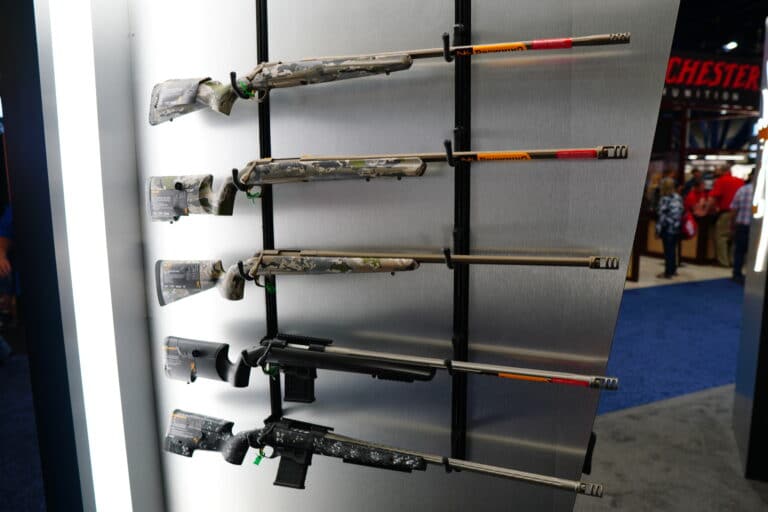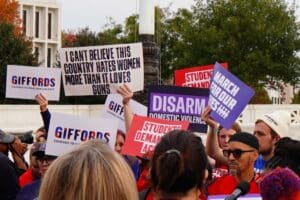A federal judge’s ruling opens up new questions on the constitutionality of felony gun bans and tries to answer them.
District Judge David Counts of Western Texas found the Federal Firearms Act’s prohibition on people indicted under felony charges from receiving firearms is unconstitutional. He applied, perhaps reluctantly, the new standard handed down by the Supreme Court in New York State Rifle & Pistol Association v. Bruen. He found the indictment-based ban couldn’t survive that text-and-tradition-based test.
“Although not exhaustive, the Court’s historical survey finds little evidence that § 922(n)—which prohibits those under felony indictment from obtaining a firearm—aligns with this Nation’s historical tradition,” Judge Counts wrote in his opinion. “As a result, this Court holds that § 922(n) is unconstitutional.”
As significant as that finding is, the judge went further. He also cast doubt on the constitutionality of federal felon gun bans overall.
“Whether this Nation has a history of disarming felons is arguably unclear—it certainly isn’t clearly ‘longstanding,'” Counts said.
The government argued in the case that the Supreme Court noted in 2008’s District of Columbia v. Heller, which first recognized the Second Amendment protects an individual right to own guns, that the decision striking down the city’s total ban on handguns should not cast doubt on felon-in-possession bans.
“Like most rights, the Second Amendment right is not unlimited,” Justice Antonin Scalia wrote for the Court in Heller. “It is not a right to keep and carry any weapon whatsoever in any manner whatsoever and for whatever purpose: For example, concealed weapons prohibitions have been upheld under the Amendment or state analogues. The Court’s opinion should not be taken to cast doubt on longstanding prohibitions on the possession of firearms by felons and the mentally ill, or laws forbidding the carrying of firearms in sensitive places such as schools and government buildings, or laws imposing conditions and qualifications on the commercial sale of arms.”
The government said the history of the felony-indictment ban was closely aligned with the convicted-felon ban and is therefore also constitutional. But Judge Counts said the Bruen test requires much more than citing short, non-binding sections of Heller.
“[H]eller’s endorsement of felon-in-possession laws was in dicta. Anything not the ‘court’s determination of a matter of law pivotal to its decision’ is dicta,” he wrote. “Dicta is therefore ‘entitled to little deference because they are essentially ultra vires pronouncements about the law.’ Or, as Francis Bacon put it, dicta is only the ‘vapours and fumes of law.’
Instead, Counts said a historical analysis is required. And the analysis he did found there were no analogous bans on felons owning guns. He noted the states did not even fully disarm those considered to be traitors to the country.
“Indeed, when Virginia disarmed all citizens who refused to take an allegiance test, it did so only partially, allowing citizens to keep ‘such necessary weapons as shall be allowed him by order of the justices of the peace at their court, for the defense of his house and person,'” Counts said. “So even ‘traitors’ unwilling to swear allegiance to the Crown retained their weapons in colonial America.”
He further cited a 2007 law review by Robert H. Churchill, who couldn’t find “a single instance in which these jurisdictions exercised a police power to prohibit gun ownership by members of the body politic” during early American history. He also pointed to a 2009 review by C. Kevin Marshall that found the first record of gun carry being regulated by the state of the carrier (being intoxicated in this case) instead of the manner of carry did not come until 1886.
Still, it seems unlikely the Supreme Court would allow one of the few gun restrictions it explicitly said was presumptively constitutional to fall under its own standard for review. But that’s where Judge Counts has a potential answer. After rejecting the argument made by New York and others, which relies on the existence of bigoted gun bans targeting Catholics and Native Americans, he suggested a potentially more viable alternative.
“[B]ruen and Heller dealt with regulations restricting where someone may keep and bear arms and unlike the challenged regulations in Bruen and Heller, § 922(n) restricts ‘who’ may keep and bear arms,” he said. “Under the Second Amendment, the “who” imbued with the right to keep and bear arms is ‘the people’—a term of art. Thus, the historical inquiry should be whether there is a historical tradition of excluding those under indictment from ‘the people.'”
He argued that other rights reserved to The People have historically been denied to certain subgroups, including felons, because they were considered excluded from The People. And those exclusions, including over who can vote or exercise certain First Amendment rights, weren’t based on bigotry like the ban cited by New York.
“[T]here is a long history of the Government regulating those rights—including restriction on who can exercise that right,” he argued. “Thus, the history of excluding specific groups from rights and powers of ‘the people’ in other constitutional contexts can provide useful analogies.”
Judge Counts concludes there likely is sufficient historical precedent to uphold a ban on gun possession by those convicted of felony charges, as is the case with the right to vote. However, he still thinks the ban for those merely indicted of a felony wouldn’t pass the test because the prohibition would come before due process was served.
The case is one of only a handful to deal with the implications of the Bruen ruling. As judges feel out how best to apply the Court’s text-and-tradition standard to key gun laws, it will be interesting to see what conclusions they reach on the best approach. Counts is the first to suggest the federal felon restriction may be unconstitutional and the first to articulate how it may not be depending on how Bruen should be interpreted.
But even he is unsure how things will play out.
“The Bruen Court made the constitutional standard ‘more explicit’ to eliminate ‘asking judges to ‘make difficult empirical judgments’ about ‘the costs and benefits of firearms restrictions,'” he said. “Bruen did not, however, erase societal and public safety concerns—they still exist—even if Bruen’s new framework prevents courts from making that analysis. As stated above, the new standard creates unknown unknowns, raising many questions. This Court does not know the answers; it must only try to faithfully follow Bruen’s framework.”







2 Responses
Counts’ opinion isn’t particularly well-written but his underlying analysis is relatively sound. At points, it reads like a rebuke and a dare to Justice Thomas’s Bruen opinion: look what your crazy absolutist Second Amendment analysis made me do.
But bans on gun possession by convicted felons are not in jeopardy; at the Founding, most felonies were capital crimes. Dead felons could not be one of “the people.”
And functional bans on those under felony indictments could still prevail under Counts’ reasoning. Gun restrictions could simply be another condition imposed by a court—in an adversarial proceeding—just like bail.
No one would question the unconstitutionality of a law that automatically and indefinitely imprisoned without court supervision anyone simply charged with a crime. Why should other civil rights be any different?
I think the point about felony punishments often including execution in early America is an interesting counter to what Counts is arguing here. But the scope of what constituted a felony was far more limited during the founding era as well, which Professor Leider pointed out on the podcast this week. It will be interesting how courts grapple with this question, but I think they’ll ultimately find convicted felon bans (or at least ones for violent felons) are constitutional. How they do it is another question.